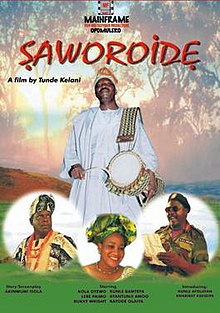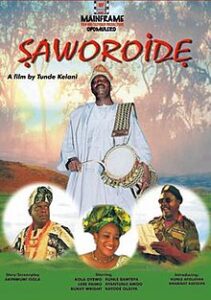The way Saworoide came to be the most recognizable drama about politics in Nollywood
The ongoing conflict between those in power and the subjects is the fundamental element of Saworoide.
Even after Saworoide was launched in 1999, its intent is still relevant 25 years later.
The presence of organizations that check themselves to make sure the general public is never taken advantage of is one of the fundamental principles of democratic government which makes it
the envy of egalitarian nations.
This is the basic idea of Saworoide with the exception that a king replaces the leader of the nation, and Tunde Kelani creates an ordinary individual and his drum that can tear the palace apart
with an appealing tune in place of the legislature and the laws.
The fundamental element of Saworoide is the perpetual conflict that exists between the governed and the authorities.
Kelani uses the made-up town of Jogbo as his blank canvas to depict a society full of corrupt politicians who occupy powerful positions solely to further their financial interests. To cling
onto the material possessions that are more important to them than the individuals they govern and the advancement of their society, such leaders lie, deceive, and commit murder.
The cunning Lapite, the ruler of Jogbo, is portrayed by Kola Oyewo with a disdainful meanness that is a fictitious representation of numerous actual existence leaders with whom Nigerian
fans can draw parallels from both past events and the present day.
To prevent having to comply with a treaty rite that he feels would obstruct his intentions to plunder, Lapite uses intimidation and deceit to gain the crown. He even resorts to
using weapons on royal officials. Political killings and the corrosive influence of establishments designed to keep individuals with his malign intentions from spearheading any forward-
thinking civilization serves as the foundation for his ascent.
The events surrounding Lapite’s misrule, his allies’ assistance, the consequences of his avarice, the responses of those who are most impacted, and the resulting anarchy all unfold just as they
would in the real world.
Saworoide delves into the dangers of capitalism as well as how the ruling class in politics condones its predatory tendencies.
The inevitable response to a powerful coalition of businesspeople abusing Jogbo’s assets and refusing to follow the laws protecting the interests of the people is to band together with elected
officials in order to subvert the values of the public good. The repercussions are unsurprisingly severe and add to the main struggle of 㹖aworoid㺹, which is the conspiracy of mechanisms
designed to safeguard the general welfare to accomplish exactly the reverse.
Given Nigeria’s political past, Lagata (Kunle Bamtefa), a military officer troubled by Lapite and his chiefs’ misrule, supports a forcible coup after this pseudo-democratic organization fails.
The violent seize it by force, and the outcome isn’t always favorable.
Lagata bemoans the inadequate growth of Jogbo and the suffering inflicted on its inhabitants by humans. With an imposing presence to whip everyone and everything into shape, Jogbo seems
new and full of hope that things might be about to change for the better.
Soon after his rise to power, however, he succumbs to the illusory charms of self-serving leadership, driven mostly by the desire to line his own coffers at the expense of the populace. Since
everything in the movie happens so quickly, some hurried and insufficient growth in character is necessary to enable this drastic shift, but it’s been shown that total authority corrupts totality.
With new oppressive systems, the misery of the Jogbo people gets worse and the restriction of liberties is more severe.
Like Nigerians in actual life, the Jogbo people are disappointed by Lagata’s broken promise of transformation, and this leads to a crucial question: Is the position of power cursed to turn all
those who occupy it into soulless monsters?
The closest Saworoide gets to a clear response is probably to imply that candidates with the incorrect perspective will perpetually be bad for the group as a whole.
The movie also deliberately positions youth as the sense of the community, the group most impacted by the activities of the privileged few, and the key player in opposing its brutality and
paving the way for a more honorable future.
Saworoide employs youth to emphasize its opposition to despotism
Kelani lives in a pessimistic Saworoide world.
The universe of Saworoide created by Kelani is cynical towards those in power, harsh in its criticism of predatory capitalism, and particularly contemptuous of the harm that the dark
romance between the two parties does to those who are ruled—it’s not a coincidence that it hits too extremely home.
The reason the movie is provocative is that it uses every aspect of actual politics to create a universe that is both a warning tale for the days to come and a duplicate of the past and
present.
At its conclusion, Saworoide urges those of all ages to work together to create an improved environment for everyone. This message is still just as relevant to the actual world now as it seemed
when the movie was first aired in 1999, 25 years later.





